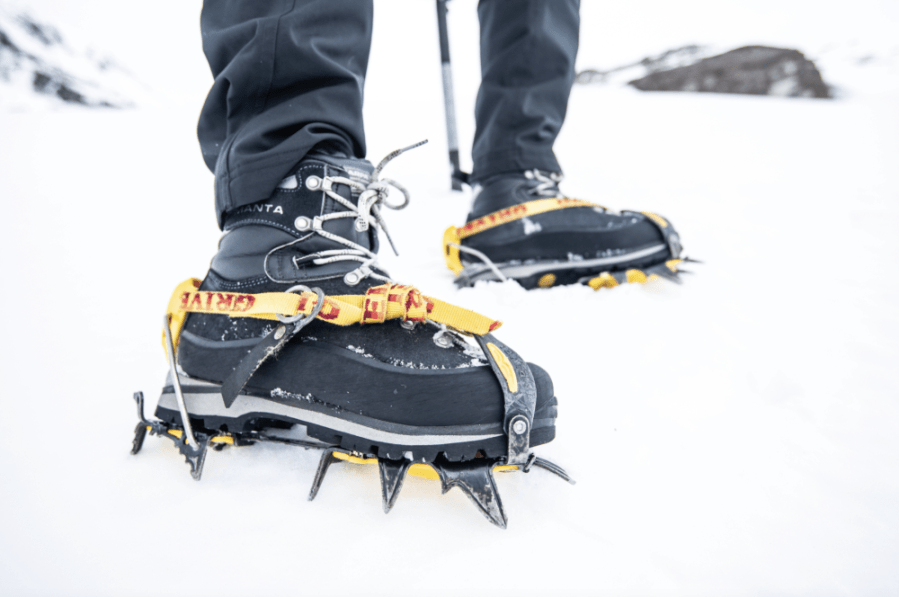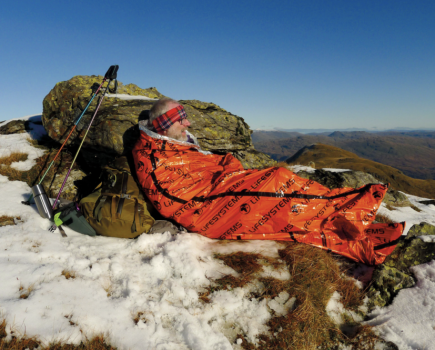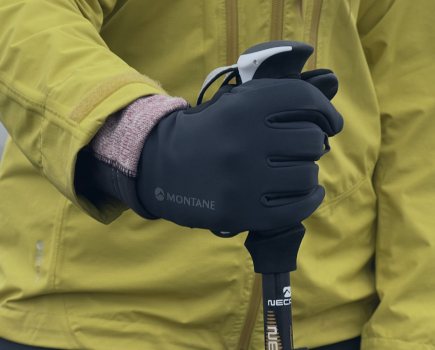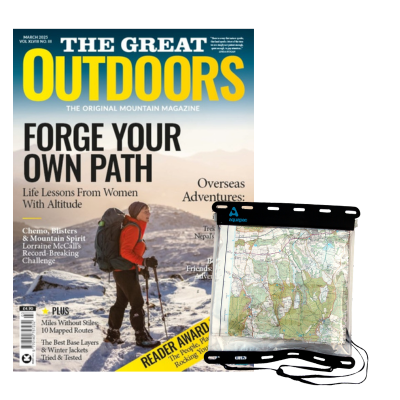There is a lot to think about when choosing winter mountaineering boots. Our maritime position makes for hugely variable conditions in the British mountains. Temperatures can range from the low teens to far below zero with extreme windchill. There may be no snow in sight, or there could be a full cover of icy nevé. Wind speeds range from flat calm to hurricane force. Choosing a boot which can cope with this spread of conditions can be tricky.
Main image: Crampon compatibility is crucial to selecting the mountaineering boot for you | Credit: James Roddie
A winter walking boot should be protective with good all-round support for your feet and ankles. It should have a waterproof membrane and sufficient insulation to keep your feet warm in cold conditions. The sole should be aggressive and the materials durable throughout. The upper and sole should be significantly stiffer than found in a summer walking boot. Winter mountaineering boots are given a ‘B’ rating. This refers to the stiffness of the sole and its crampon compatibility.
In this review we are covering B1 and B2 boots. B1 boots are generally suitable for non-technical winter walking, and should be compatible with C1 crampons. B2 boots have a stiffer sole and are intended for more serious winter conditions, technical walking and low-grade winter climbing. These should feature a heel welt and be compatible with C2 crampons.
When choosing a winter boot, consider where and in what conditions you most commonly walk. If you frequent the highest tops of the Scottish Highlands every winter, then you are likely to need a different boot to someone who walking below 900m in the Lake District or Wales. Higher levels of insulation and a stiffer sole will be more of a priority for predominantly cold conditions, whereas breathability and overall comfort may come first for walking in milder winter weather.
The best mountaineering boots we’ve tested
La Sportiva Aequilibrium
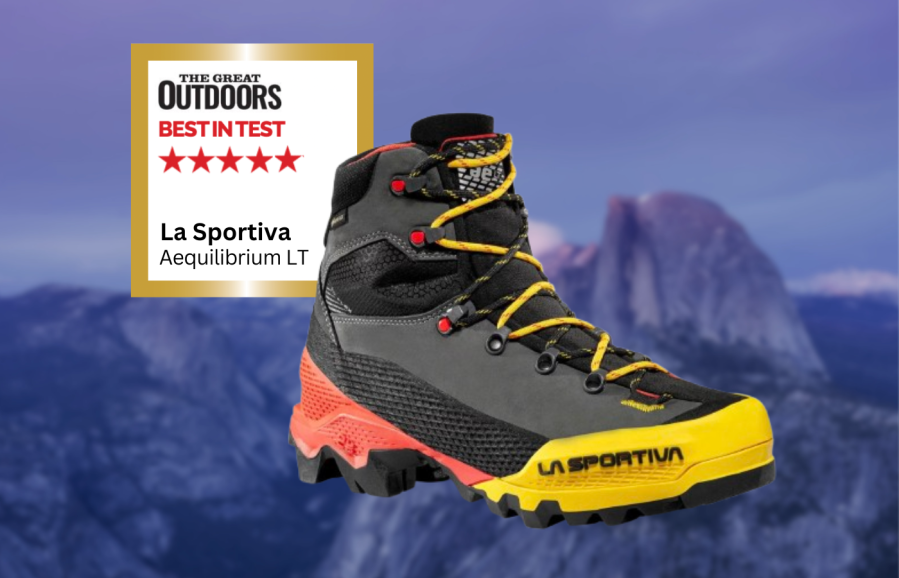
Kirsty Pallas’ Best in Test 2025
The Aequilibrium is a light and comfortable boot, that will take winter hillwalking and easier graded routes in its stride.- comfort
- warmth
- weight
- laces come loose
| Quick specs |
|---|
| Price: £345 |
| Weight: 1156g (UK5 pair) |
| B rating: B2 |
| Waterproofing: Goretex Performance Comfort |
| Upper: Nubuck |
| Crampon welts: Heel welt |
| Sole: Vibram SpringLug Tech rubber |
| Sizes: EU 36-42 or UK 3.5-8 with half sizes |
| Men’s version? Yes |
| www.lasportiva.com |
On first glance, I thought these were designed for the Alps, and wouldn’t be warm or waterproof enough for Scottish winter. How wrong I was! They’ve become my first choice for both winter walking and mountaineering routes. The depth of the lugs is great for slicing steps into snow, and combined with the stiffness, they feel very secure on steeper gullies and ridges. There’s a climbing zone at the toe, for those rocky steps in spring as snow starts to melt.
Two hooks on the ankle let you adjust the tightness, but I did find the laces coming loose and needing reknotted a couple of times throughout the day. The Aequilibrium is a light and comfortable boot, that will take winter hillwalking and easier graded routes in its stride.
Read more: Kirsty Pallas’ full La Sportiva Aequilibrium LT review
Hanwag Makra Pro GTX
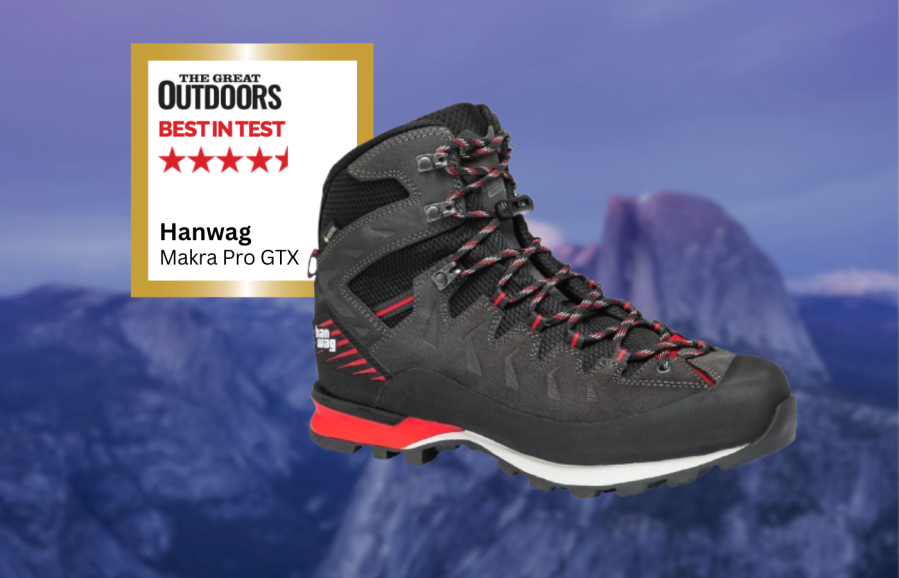
James Roddie’s Best in Test 2025
If you are looking for a boot that excels in everything from easy winter climbing to long hill-walking expeditions, look no further.- comfort
- durability
- lacing design
- resoleable
- rubber rand could extend higher up boot
| Quick specs |
|---|
| Price: £300 |
| Weight: 1610g (UK size 9.5 pair) |
| B rating: B2 |
| Waterproofing: Goretex |
| Upper: Suede with textile panels |
| Crampon welts: Heel welt |
| Sole: Vibram |
| Sizes: UK 6-13/EU 39.5-48.5 |
| Men’s version? Yes |
| hanwag.com |
The Hanwag Makra Pro GTX has become one of my favourite all-round winter boots. If like me, you do a mix of winter walking, classic mountaineering and easy winter climbing, then finding a boot which performs strongly in all disciplines is good news. If you are looking for a boot which will last several years, and excel in everything from easy winter climbing to long hill-walking expeditions, look no further.
A standout feature is the mechanical lace lock. This helps to achieve a perfect fit around the heel. It allows you to easily change tension around the ankle without changing tension around the toe. It works really well and remains locked unless adjusted. This is easy and smooth, even when wearing bulky gloves.
Read more: James Roddie’s full Hanwag Makra Pro GTX review
Mammut Kento Pro High
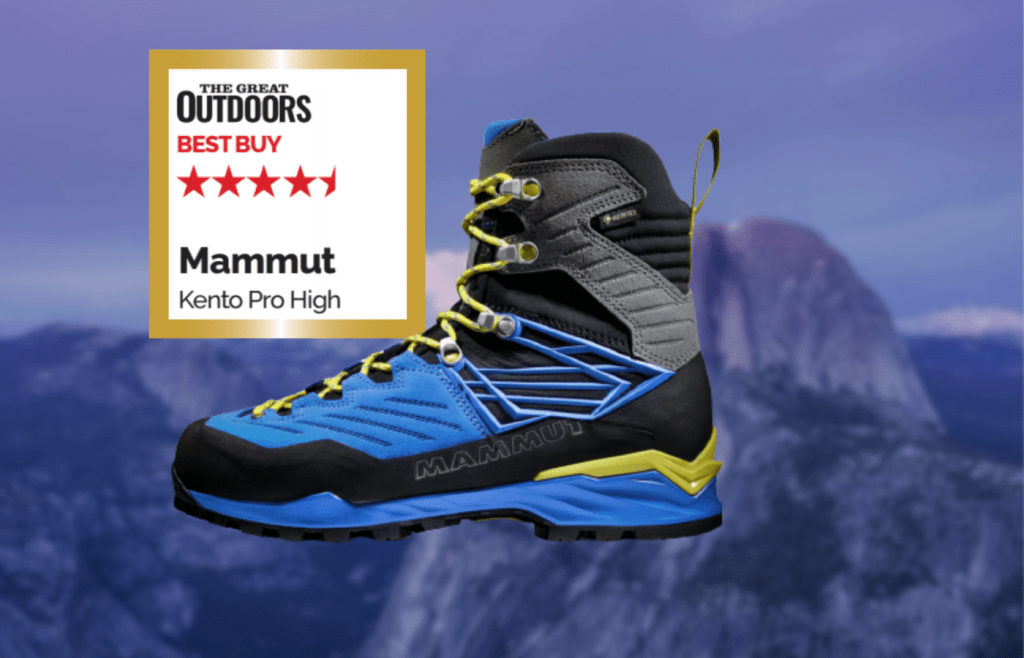
Kirsty Pallas’ Best in Test 2023
The Kento Pro High gives an impressive warmth rating temperature down to -20 degrees Celsuis.- price
- insulation
- runs small
- fabric lace eyelets
| Quick specs |
|---|
| Price: £290 |
| Weight: 1320g (EU38, pair) |
| B rating: B2 |
| Waterproofing: Goretex |
| Upper: Velours leather |
| Crampon welts: Heel welt |
| Sole: Vibram Hexa Tech |
| Sizes: UK 3.5-8.5 with half sizes |
| Men’s version? Yes |
The Mammut Kento Pro High is the only boot in this test that gives a warmth rating temperature, which is down to -20 degrees Celsuis. Between this and the 3D memo foam cushioning, it does seem to run small, and I could only wear a thin sock which still felt a bit tight, so I would definitely size up if I was getting another pair. It is well waterproofed, and the insulation is very beneficial especially when you’re standing around.
Read more: Kirsty Pallas’ full review of the Mammut Kento Pro High. This boot was also recommended by Lucy Wallace in 2021 winter tests – you can read her full verdict here.
Meindl Vakuum GTX
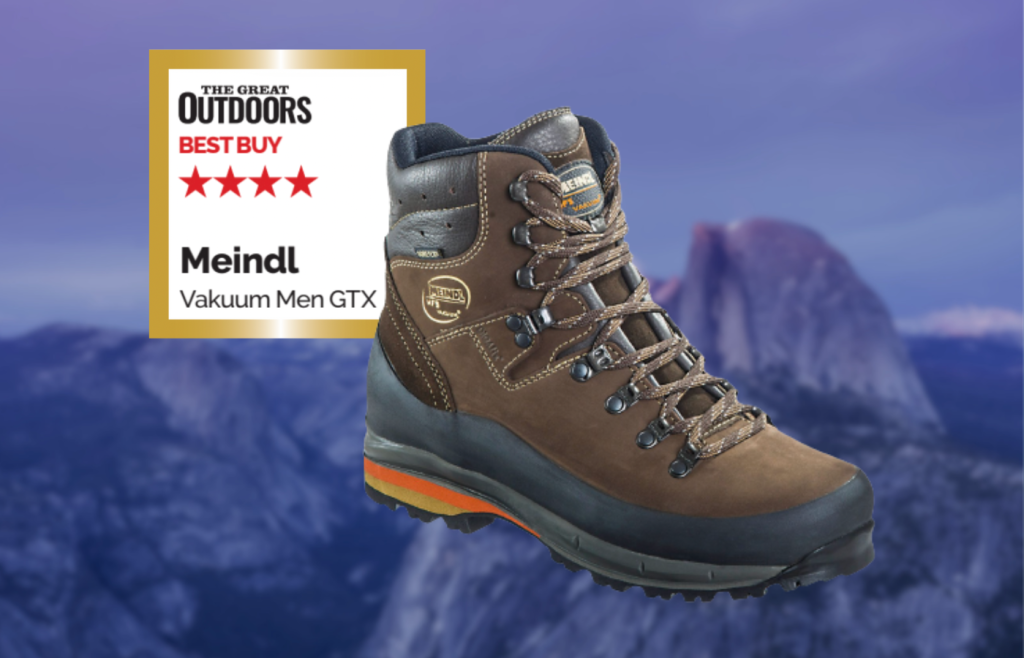
Peter Macfarlane’s Best in Test 2023
With impressive comfort straight out of the box, this is a grippy and versatile boot- comfort
- grip
- wide range of outdoor use
- not as stiff soled as some winter boots
| Quick specs |
|---|
| Price: £309.99 – £329.99, depending on size |
| Weight: 1660g (EU41-2, pair) |
| B rating: B1 equivalent |
| Waterproofing: Goretex |
| Upper: Nubuck leather upper, rubber rand |
| Crampon welts: None |
| Sole: Meindl Multigriff 2 by Vibram |
| Sizes: EU39-49 with half sizes up to 46 |
| Men’s version? Yes |
Straight out of the box, the Meindl Vakuum Men GTX felt stiff. It’s the second heaviest men’s boot in the review, so I was concerned they would be a little unwieldy until broken in. An hour into their first walk, I adjusted the laces at a rest stop and realized that they had already settled into an extremely comfortable fit. We ending up adding at extra 20km walking to our day, and I had no foot issues.
Read more: Peter Macfarlane’s full review of the Meindl Vakuum Men’s GTX
Lowa Cevedale Evo GTX
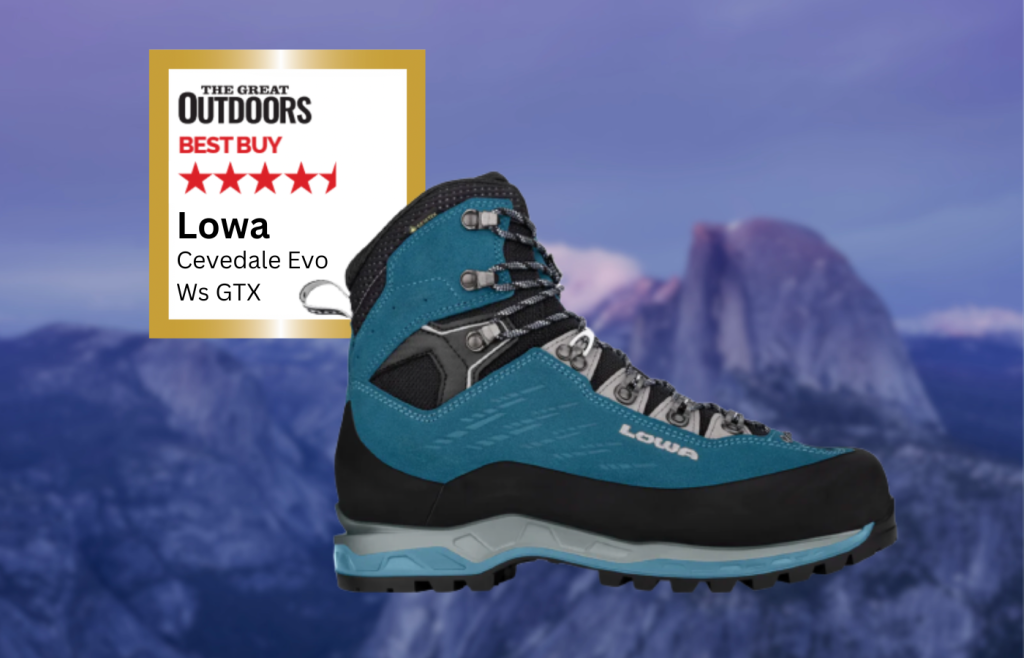
Lucy Wallace’s Best in Test 2021
These are an excellent all-round option well suited to easy winter climbs and long Munro days- build quality
- toughness
- none
| Quick specs |
|---|
| Price: £275 |
| Weight: 11390g (pair) |
| B rating: B2 |
| Outer Sole: Vibram Scalatore Evo |
| Upper: Suede, fabric |
| Sizes: 4 – 9 |
| Men’s version? Yes |
The layers of bright blue suede, fabric and a Gore-Tex insert in the uppers provide sufficient insulation for sub-zero temperatures, and there is plenty of cushioning around the ankle. Whilst not the lightest, it’s hard to find any fault with these boots, as they do precisely what I would expect good winter boots to do. Everything required is here, and feels well made and solid. These are an excellent all-round option well suited to easy winter climbs and long Munro days.
Read more: Lucy Wallace’s Lowa Cevedale Evo GTX Ws full review
Lowa Alpine Pro GTX
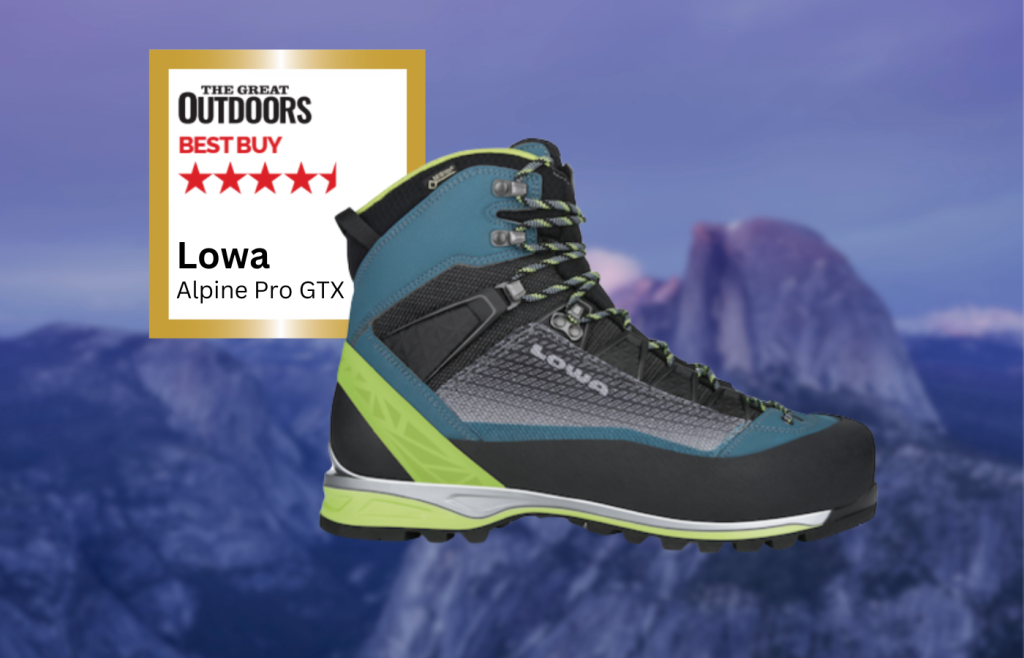
David Lintern’s Best in Test 2021
As the name suggests, this is an alpine boot with some excellent updates.- reduced price
- grip
- lacing
- nothing
| Quick specs |
|---|
| Price: £250 |
| Weight: 860g (pair) |
| B rating: B2 |
| Outer Sole: Vibram Alp Trac |
| Upper: Suede, synthetic |
| Sizes: 8 – 12 |
As the name suggests, this is an alpine boot, but brought up to date. Stiffness is at the lower end of B2 and as such there’s enough flex in the toe to make walking more comfortable, but enough stiffness in the sole to provide a good platform for crampons and to allow edging on snow and ice. The Vibram sole provides excellent traction, even on rimed up rock.
Read more: David Lintern’s Lowa Alpine Pro GTX review
Asolo Freney Evo LT GV
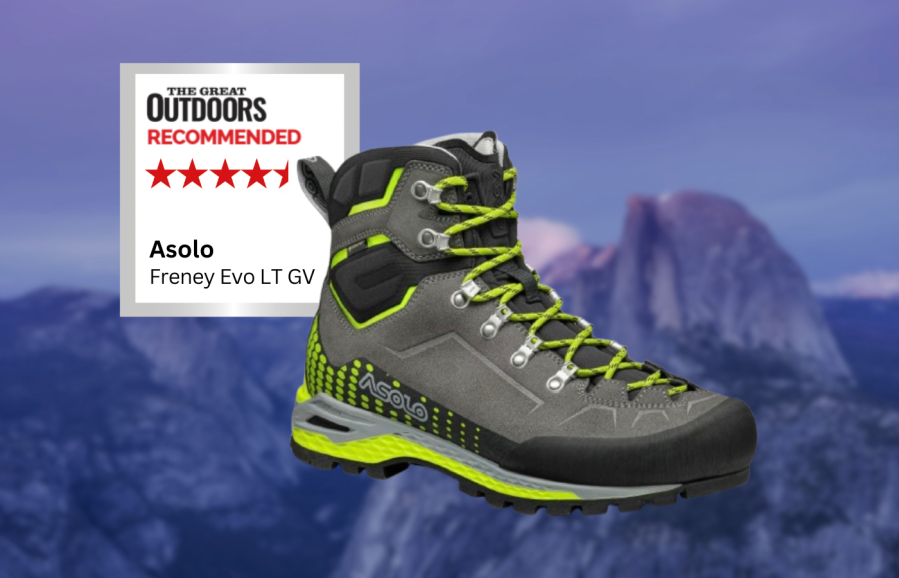
Kirsty Pallas recommends
Although slightly heavier than other boots on test, these suit cold and wet days.- warmth
- comfort
- weight
| Quick specs |
|---|
| Price: £295 |
| Weight: 1313g (UK5 pair) |
| B rating: B2 |
| Waterproofing: Goretex Performance Comfort |
| Upper: 2.2-2.4mm Perwanger leather |
| Crampon welts: Heel welt |
| Sole: Vibram 1229 Mulaz |
| Sizes: EU 37.5-42 or UK 4.5-8 with half sizes |
| Men’s version? Yes |
| www.asolo.com |
The Asolo Freney Evo LT GV is a sturdy and reliable boot from Asolo – not the lightest, but warm and secure. The upper is Perwanger leather, with what feels like a thin layer of insulation, which keeps your feet both warm and dry. These are the snuggest fit of all the boots on this test, but as they are so cosy, I could wear a thinner sock and not have any issues. There’s a lot of padding and a flex segment around the ankle, which keeps the fit comfortable and means the boot moves with you. A rubber rand surrounds the boot, protecting the leather. They are slightly heavier than other on test here, but I enjoyed using these boots, especially on cold and wet days, as I knew my feet would stay comfy and dry.
Read more: Kirsty Pallas’ full Asolo Freney Evo LT GV review
Dolomite Torq Tech GTX
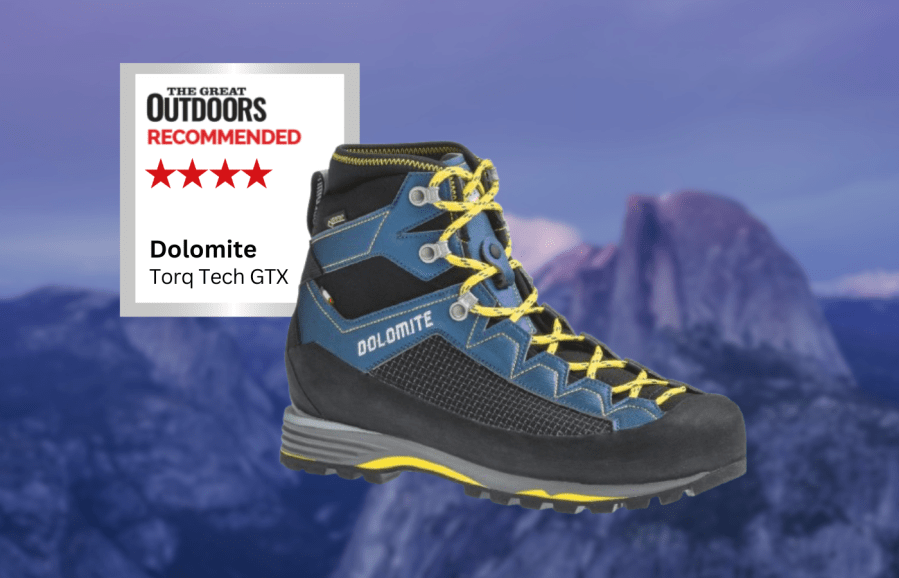
Kirsty Pallas recommends
I think they’re a great ‘winter-lite’ boot, and work well for early or late winter in more stable conditions.- weight
- low bulk
- waterproofing
| Quick specs |
|---|
| Price: £335 |
| Weight: 1205g (UK5 pair) |
| B rating: B2 |
| Waterproofing: Goretex Performance Comfort |
| Upper: Coated Microfibre |
| Crampon welts: Heel welt |
| Sole: Vibram Mulaz |
| Sizes: EU 37-42 or UK 4-8 with half sizes |
| Men’s version? Yes |
| www.dolomite.it |
Dolomite are, funnily enough, Italian, and the Dolomite Torq Tech GTX model does feel suited to the Alps or with Via Ferrata in mind. However, they are warmer than they look, and suit British winter better than expected. The upper is made up of several layers of fabric, with the main component being a coated microfibre. Non vegan glues may still be used here, but the boot does avoid animal skin in its construction, and the use of synthetics makes for a light, low bulk boot. It is still warm enough and dries quickly. There’s room for flex in the ankle built in and a full surround rubber rand.
I think they’re a great ‘winter-lite’ boot that will work well for early or late winter in more stable conditions.
Read more: Kirsty Pallas’ full Dolomite Torq Tech GTX review
Salewa Ortles Edge Mid
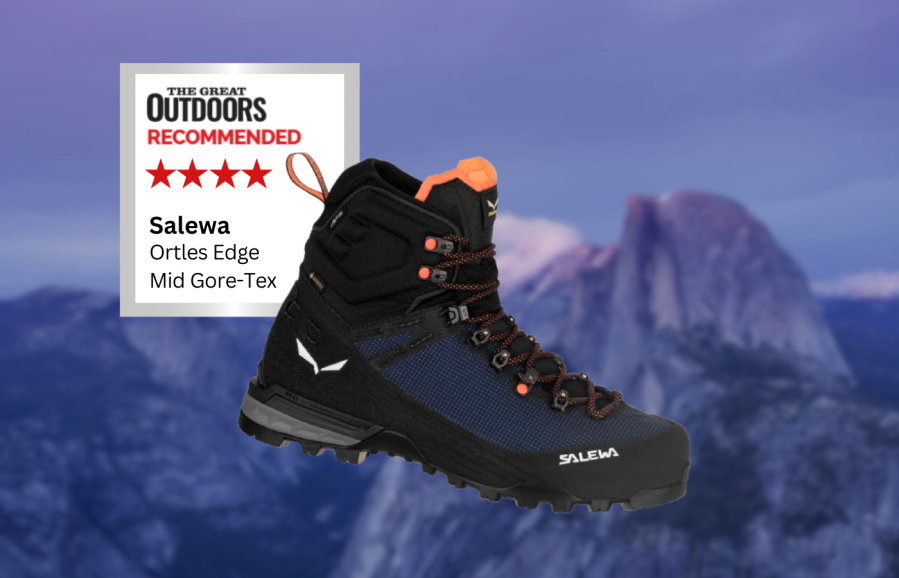
James Roddie recommends
This boot performs really well as a ‘fast and light’ option, but for the coldest days in Scotland with full snow cover, I would opt for a warmer boot with a stiffer sole.- lightweight
- versatile
- MFF+ footbed allows fit flexibility
- Anti-debris stretch gaiter too short
| Quick specs |
|---|
| Price: £310 |
| Weight: 1240g (UK size 9.5 pair) |
| B rating: B1 |
| Waterproofing: Goretex performance comfort membrane |
| Upper: Nylon |
| Crampon welts: Heel welt |
| Sole: Pomoca Alpine Dynamic |
| Sizes: UK 6-12/EU 39-47 (with half sizes) |
| Men’s version? Yes |
| salewa.com |
This is a lightweight and versatile boot. The sole is not as stiff as some winter boots, but there is a good edge for kicking into firm snow and a heel welt makes it compatible with semi-automatic crampons. A climbing zone at the toe helps for performance on scrambling terrain. The nylon upper is very flexible and this helps the boot to be comfortable straight out of the box. The ‘ankle protector system’ does its job well, the area substantially padded with thermoformed material. This is effective at supporting your ankles on steep and rocky descents, and helps prevent any bruises to your ankles in boulder fields.
I really like the 3D lacing system. Overall, I was impressed with the Ortles Edge Mid Gore-Tex. It performs really well as a ‘fast and light’ winter boot, but for the coldest days in Scotland with full snow cover, I would opt for a warmer boot with a stiffer sole.
Read more: James Roddie’s full Ortles Edge Mid Gore-Tex review
AKU Superalp V-Light
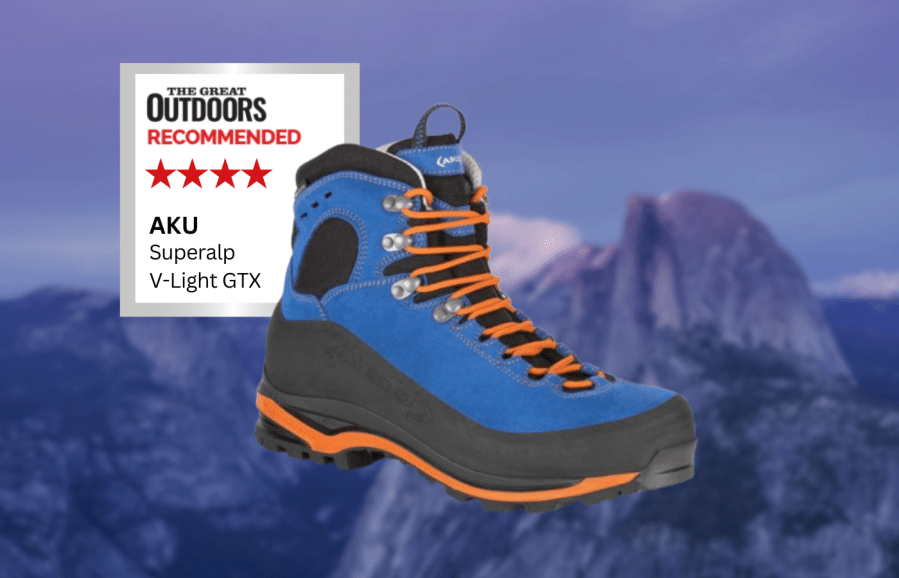
James Roddie recommends
The eco credentials of this excellent boot for milder conditions will appeal to many.- breathability
- environmental credentials
- not well insulated
- sole durability
| Quick specs |
|---|
| Price: £300 |
| Weight: 1490g (UK size 9.5 pair) |
| B rating: B1 |
| Waterproofing: Goretex performance comfort recycled |
| Upper: Recycled microfibre RePet |
| Crampon welts: None |
| Sole: Vibram Curcuma |
| Sizes: UK 5-13/EU 38-48 |
| Men’s version? No (closest is the Superalp Light GTX) |
| aku.co.uk |
This is an excellent boot, best suited for three season and milder winter conditions. At 745g for a size 9.5 boot, it feels surprisingly lightweight for its sturdiness. It has a high ankle collar, nicely padded and offering plenty of support. A 360° rubber rand extends high up the boot, particularly at the heel, and this does a great job of protecting the upper from scuffing. The Vibram sole has deep lugs and an aggressive heel break. It really shines for use on soft, wet ground, where grip is superb. It does seem to wear quite quickly if being used on rocky ground, showing noticeable wear after a winter day in Torridon. Breathability really is excellent. AKU produce these boots in Italy (where they are based), which may help to reduce their overall carbon footprint.
Read more: James Roddie’s full AKU Superalp V-Light GTX review
Scarpa Ribelle HD
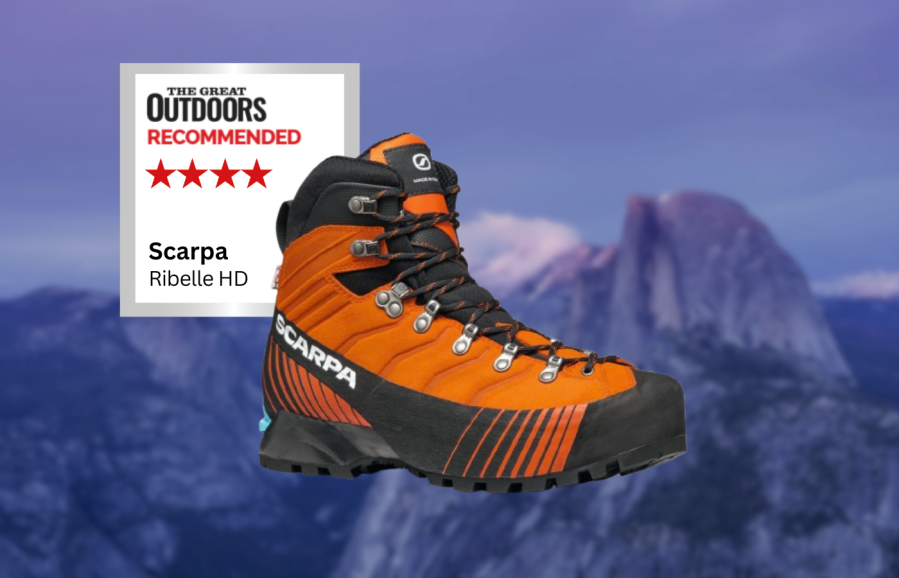
James Roddie recommends
As long as I kept moving, these boots kept my feet impressively warm even in full winter conditions- versatile
- lightweight
- tongue design
| Quick specs |
|---|
| Price: £330 |
| Weight: 1620g (UK size 9.5 pair) |
| B rating: B2 |
| Waterproofing: HDry |
| Upper: 2.5mm suede |
| Crampon welts: Heel welt |
| Sole: Vibram |
| Sizes: UK 6.5-13 / EU 40-48 (with half sizes) |
| Men’s version? Yes |
| scarpa.co.uk |
The Scarpa Ribelle HD is intended for ‘fast and light’ use in the mountains. The Vibram sole has an aggressive tread which performs well on wide variety of terrain. They dried out more quickly than boots with a Gore-Tex lining. Throughout my testing these boots proved really versatile in a mix of conditions and use – cases. They are lightweight, breathable and comfortable enough for multi-day hikes, yet sufficiently rigid and technical enough for winter mountaineering.
Read more: James Roddie’s full Scarpa Ribelle HD review
Scarpa Manta Tech
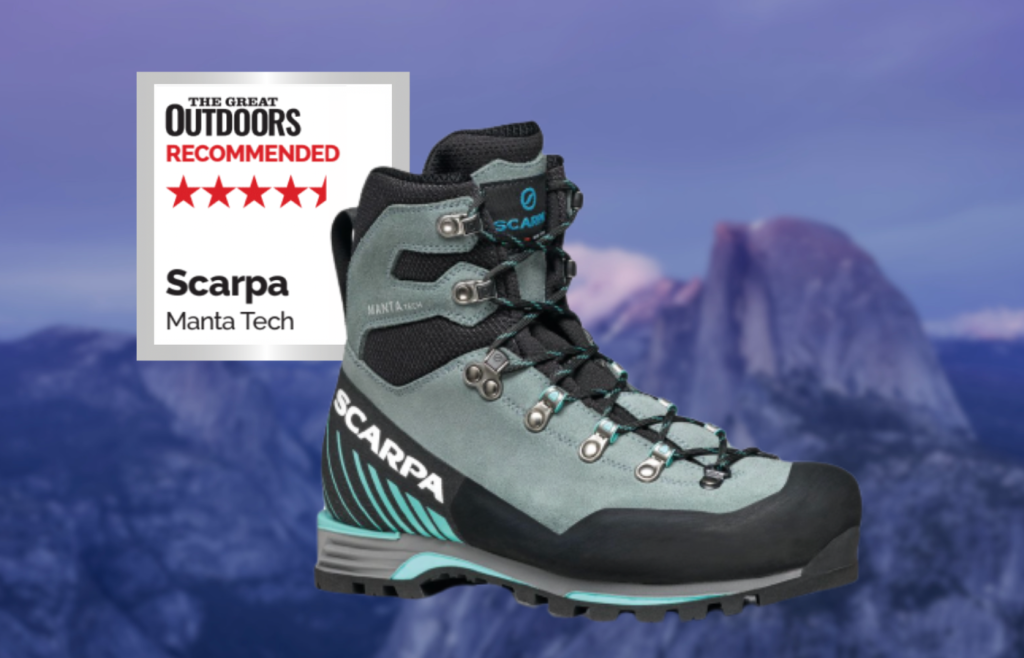
Kirsty Pallas recommended in 2023
The Manta Tech is equally solid as its predecessor but weighs less in a welcome update- weight
- comfortable fit
- price
- pressure on top of foot
| Quick specs |
|---|
| Price: £350 |
| Weight: 1285g (EU 38, pair) |
| B rating: B2 |
| Waterproofing: Goretex Insulated Comfort |
| Upper: 3mm Suede Perwanger |
| Crampon welts: Heel welt |
| Sole: Vibram Pentax Precision XT |
| Sizes: EU 36-42 with half sizes |
| Men’s version? Yes |
| scarpa.co.uk |
The Scarpa Manta is a classic B2 winter boot, often used for hire because of their reliability and sturdiness. The newer Manta Tech is an equally solid and comfortable option but weighs less than its predecessor.
Read more: Kirsty Pallas’ full review of the Scarpa Manta Tech. David Lintern also recommended the Scarpa Manta Tech in his 2021 reviews. You can read his verdict here.
Salewa Ortles Ascent Mid

Peter Macfarlane recommended in 2023
An attractive boot, with good warmth and comfort, but with a few features that don’t work as well as possible- comfortable ankle collar
- solid sole unit
- debris gaiter not high enough
- no lace lock at ankle
| Quick specs |
|---|
| Price: £340 |
| Weight: 1432g (EU38, pair) |
| B rating: B2 |
| Waterproofing: Goretex Insulated Comfort |
| Upper: 2mm Suede |
| Crampon welts: Heel welt |
| Sole: Vibram Alpine Guide |
| Sizes: EU 35-42 with half sizes |
| Women’s version? Yes |
| salewa.com |
The Salewa Ortles Ascent Mid is an attractive boot, with good warmth and comfort, but with a few features that I don’t think work quite as well as they could. The suede upper with Goretex membrane is waterproof and comfortable to wear without any breaking in, even for a wide forefoot, despite not looking particularly wide. The ankle collar is soft and flexible at the back to make descending feel comfortable, but supportive at the sides for ankle protection. It’s the only boot in my selection where the tongue is a separate unit from the main boot, which does mean it can move around more independently.
Read more: Peter Macfarlane’s full review of the Salewa Ortles Ascent Mid
AKU Trekker Therm200
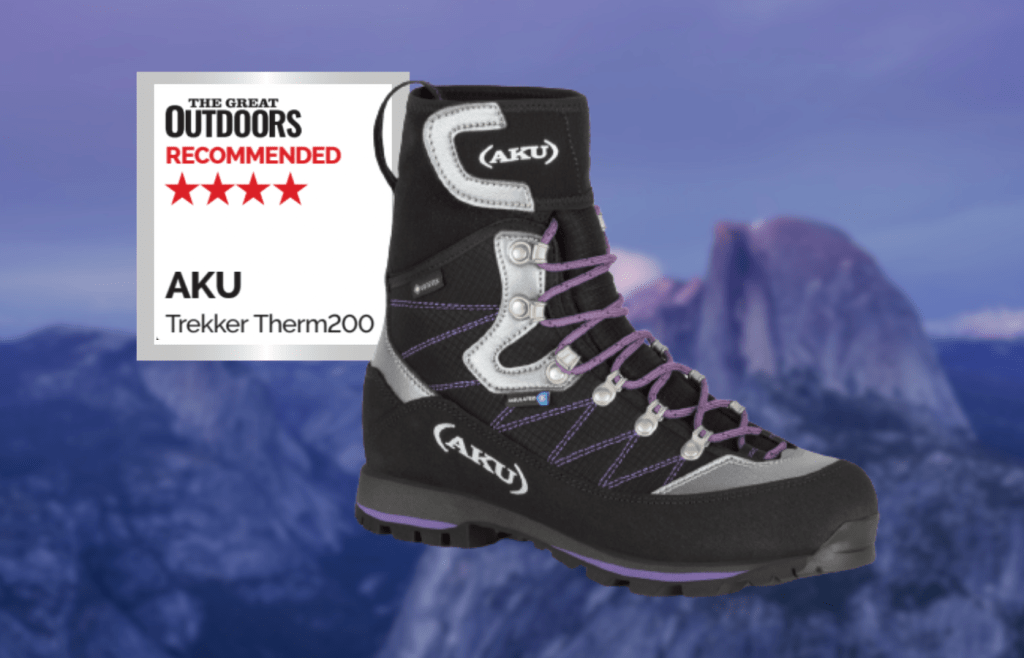
Kirsty Pallas recommended in 2023
These boots feel like clouds on your feet – but aren’t B rated for crampon use in winter conditions- weight
- sole flex when walking
- not B rated
- lace durability
| Quick specs |
|---|
| Price: £245 |
| Weight: 984g (EU38, pair) |
| B rating: none |
| Waterproofing: Goretex insulated comfort |
| Upper: AKU Air8000 |
| Crampon welts: None |
| Sole: Vibram Curcuma |
| Sizes: EU35-42 with half sizes |
| Men’s version? Yes |
| aku.co.uk |
The AKU Trekker Therm200 is a brand new boot from AKU, and is the only boot in this test that is not officially B rated. This is very noticeable in the weight – they are extremely light as there’s no shank in the midsole, and alongside a synthetic upper they feel like clouds on your feet! They are designed to be worn with snowshoes but will take a flexible C1 crampon (with both front and heel baskets), although AKU only recommends this for limited use.
Read more: Kirsty Pallas’ full review of the AKU Trekker Therm200.
Altberg Mallerstang Mountain Boot
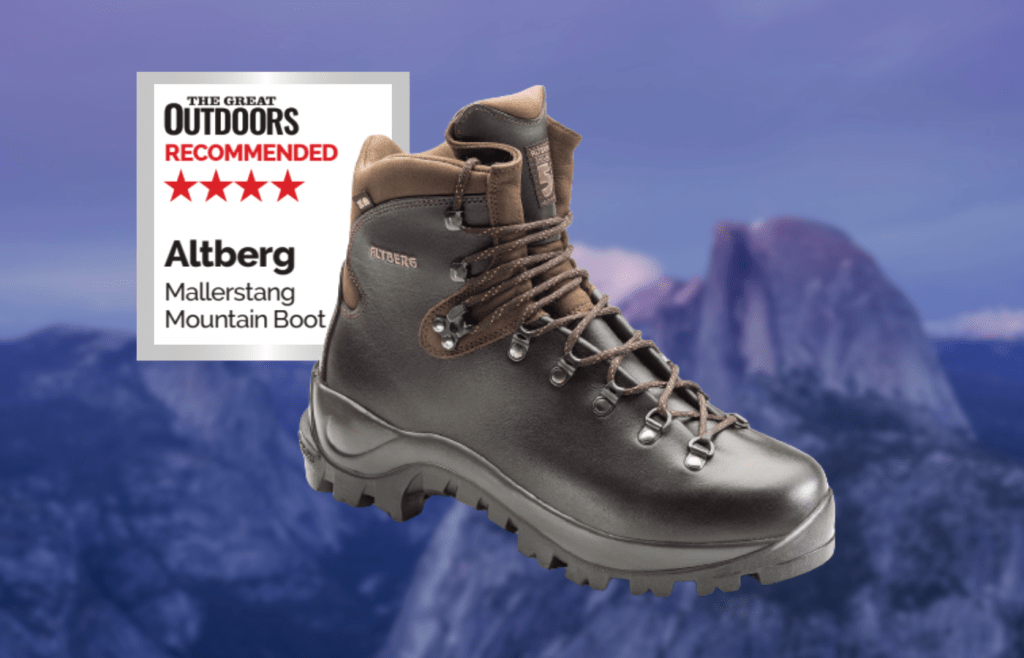
Peter Macfarlane recommended in 2023
This traditional mountain boot in looks and construction needs some breaking in – but proves grippy and durable- durability
- reproofable upper
- resoleable
- grip
- fit options
- initial breaking in
- weight
| Quick specs |
|---|
| Price: £264 |
| Weight: 1820g (EU41-2, pair) |
| B rating: B2 |
| Waterproofing: Sympatex waterproof lining |
| Upper: 2.8mm one piece Anfibio leather |
| Crampon welts: Heel welt |
| Sole: Vibram Ice Trek |
| Sizes: EU38-48 including half sizes and 5 width fittings |
| Women’s version? Unisex |
The Altberg Mallerstang Mountain Boot is a traditional mountain boot in looks and construction. The upper is 2.8mm thick leather which is tough and durable but which also makes the boot very stiff to wear initially. It was the only boot in my selection that I had to break in at home, before trying some short walks and only then taking them into the hills.
Read more: Peter Macfarlane’s full review of the Altberg Mallerstang Mountain Boot.
Hanwag Ferrata II GTX
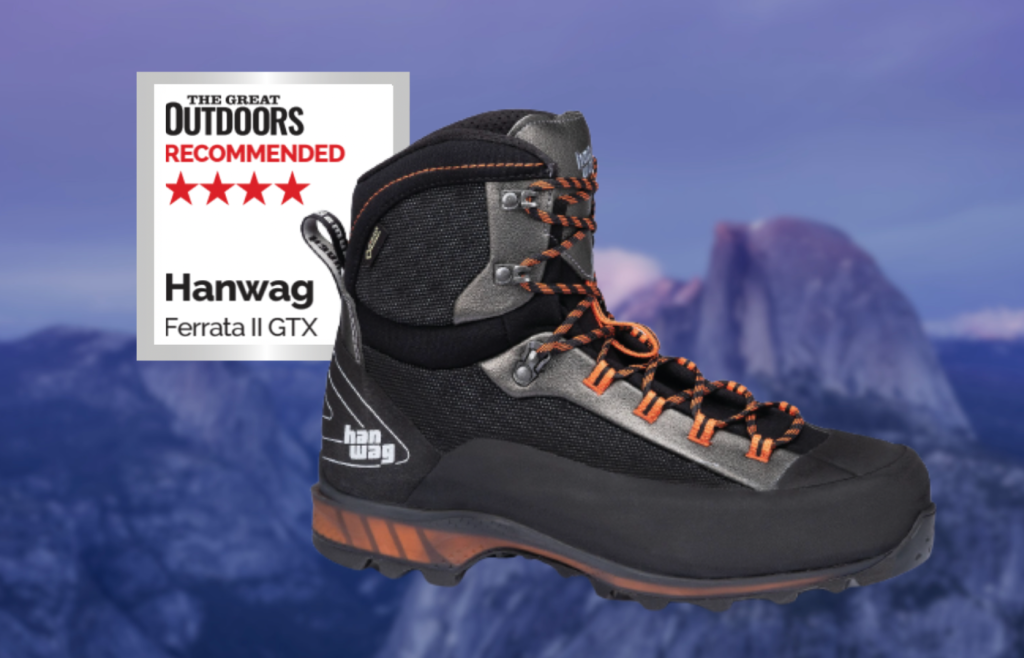
Peter Macfarlane recommended in 2023
This has the look of a rigid alpine climbing boot but has a very different feel, both on the foot and in its range of uses- light
- grippy
- dexterous
- price
| Quick specs |
|---|
| Price: £335 |
| Weight: 1550g (EU41-2, pair) |
| B rating: B2 equivalent |
| Waterproofing: Goretex waterproof lining |
| Upper: Synthetic, microfiber, rubber overlay |
| Crampon welts: Heel welt |
| Sole: Vibram Climbing Zone |
| Sizes: EU39-47 including half sizes |
| Women’s version? Yes |
The Hanwag Ferrata II GTX has the look of a rigid alpine climbing boot but has a very different feel, both on the foot and in its range of uses. The upper is a mix of synthetic materials, some with a leather feel and some have a woven texture. Different weights of these materials are used to create alternating areas of strength or flexibility which means the Ferrata was comfortable straight from the box with no breaking in. Ankle movement in the upper was immediately natural and I could wear them on a shorter hill day straight away.
Read more: Peter Macfarlane’s full review of the Hanwag Ferrata II GTX
Keen Revel IV High Polar
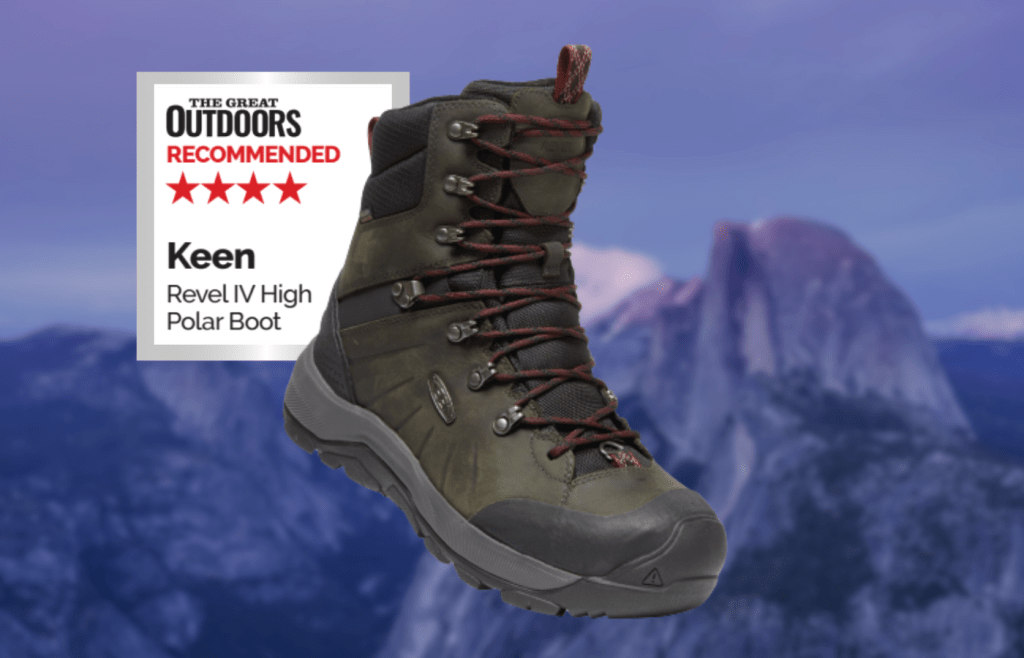
Peter Macfarlane recommended in 2023
Keen have made a good winter boot with flexibility and warmth being the priority- weight
- comfort
- range of winter use
- not stiff enough for traditional winter walking or crampons
| Quick specs |
|---|
| Price: £165 |
| Weight: 1550g (EU41-2, pair) |
| B rating: B0 |
| Waterproofing: KEEN.DRY waterproof lining |
| Upper: leather and mesh upper with recycled PET insulation |
| Crampon welts: none |
| Sole: Kenn.Polar Traction |
| Sizes: EU40-49 with half sizes up to 45 |
| Women’s version? Yes |
Keen have always taken a different approach to the design of their outdoor winter boots with flexibility and warmth being the priority. Any thoughts of crampon compatibility is up to you, the user, to work out. Lightweight flexible crampons suit winter Keens very well but the boots’ use in the winter hills can take a little adapting to. This is the case with the Keen Revel IV High Polar Boot.
Read more: Peter Macfarlane’s full review of the Keen Revel IV High Polar
Hanwang Makra Combi
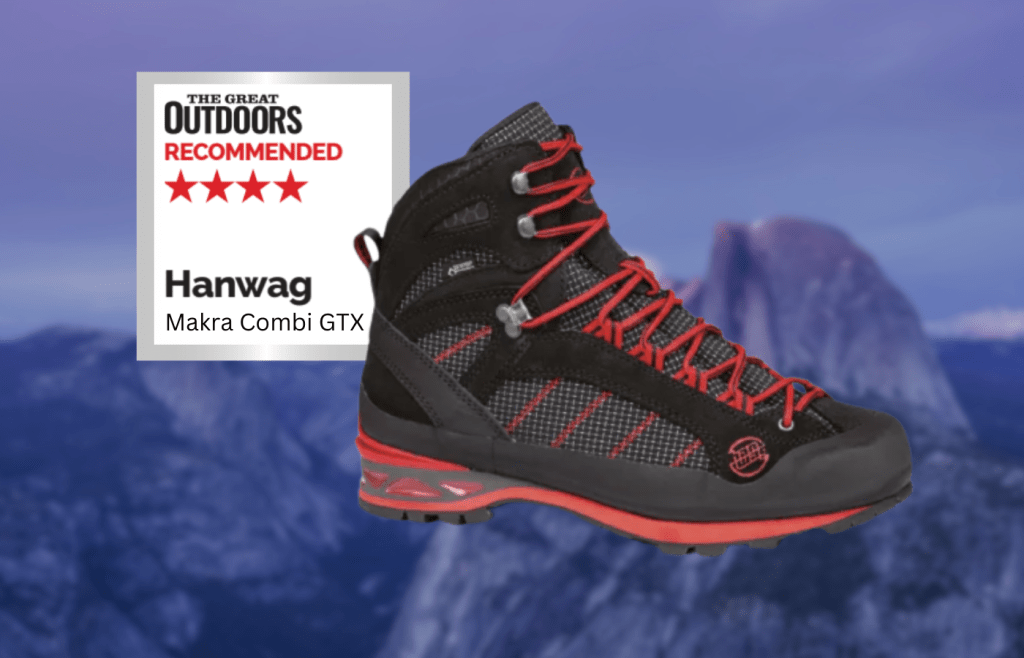
David Lintern recommended in 2021
The lightweight, modern boot has just one downside in its rocker but is otherwise an excellent and adaptable boot- weight
- fit
- adaptability
- rocker
| Quick specs |
|---|
| Weight: 730g |
| B rating: B2 |
| Upper: suede, cordura |
| Crampon welts: none |
| Outer sole: Vibram Pepe |
| Sizes: 6 – 12 |
The Makra is a smart looking, ultra-modern offering, and a honeycomb structure in the sole and modern synthetic upper means it’s the lightest boot in my test.
Read more: David Lintern’s full review of the Hanwang Makra Combi GTX review
AKU Tengu GTX
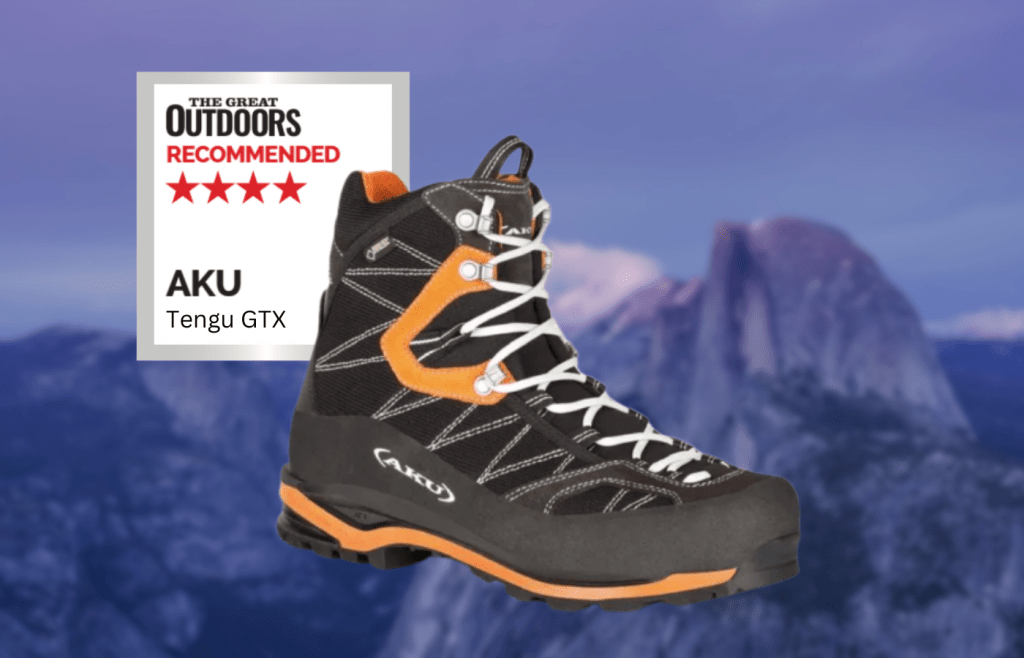
David Lintern recommended in 2021
This narrow, climbing-focussed boot has a slight flex in the forefoot but offers total confidence on ascent- grip
- lacing
- fit
| Quick specs |
|---|
| Weight: 880g |
| B rating: B2 |
| Upper: suede and nylon |
| Crampon welts: none |
| Outer sole: Vibram Curcuma |
| Sizes: 4.5 – 12 |
This is the most climbing-focused boot in the test. Sole stiffness is ‘classic B2’, with a slight flex in the forefoot and very stiff laterally. The fit is ‘Italian’; on the longer, narrower side. It’s especially narrow at the toe, with a lower volume internally than others here. In practice for me this means a little toe scrunch on descent, but total confidence on ascent.
Read more: David Lintern’s full review of the Aku Tengu GTX review
Meindl Litepeak Pro GTX
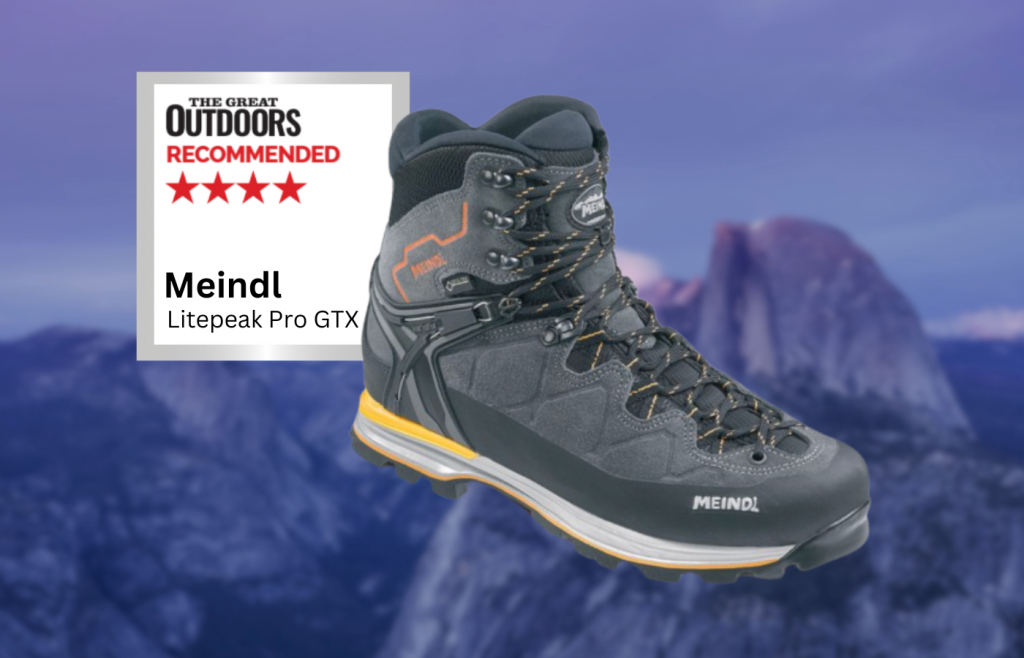
David Lintern recommended in 2021
In some ways this B1 rated boot is a perfect hybrid of traditional 3 and 4 season footwear.- relaxed fit
- adaptability
- stiff ankle cuff
| Quick specs |
|---|
| Weight: 890g |
| B rating: B1 |
| Upper: suede and mesh |
| Crampon welts: none |
| Outer sole: Vibram Alpin |
| Sizes: 6 – 12 |
The Litepeak is the only B1 boot in my selection. As such it’s a bit of an odd one out, but that’s not a criticism. In some ways this is a perfect hybrid of traditional 3 and 4 season footwear.
Read more: David Lintern’s full review of the Meindl Litepeak Pro GTX review
Salewa Raven 3 Ws GTX
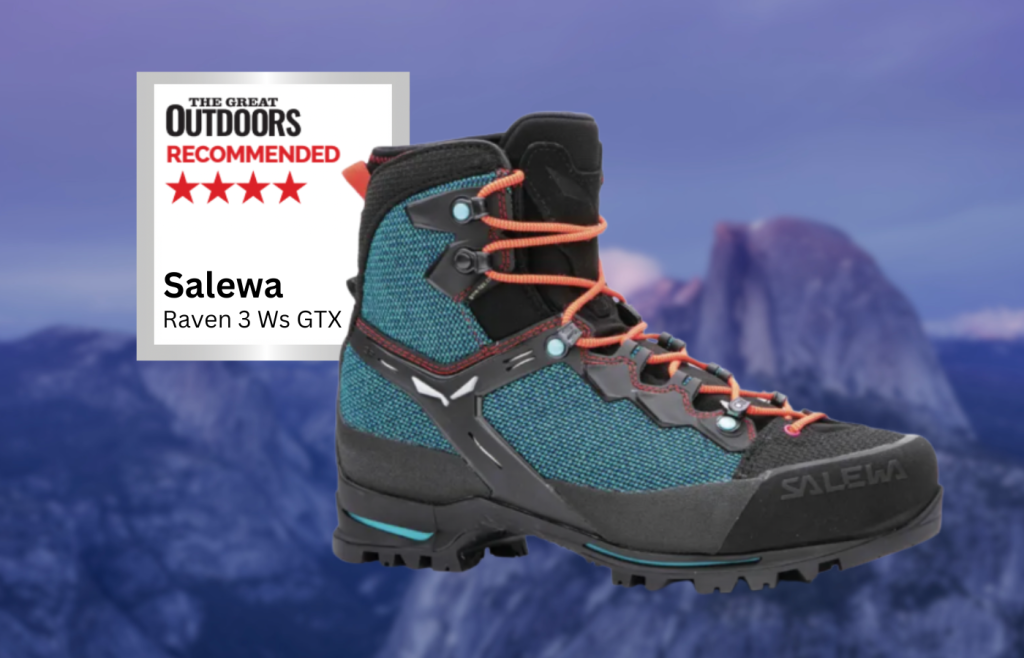
Lucy Wallace recommended in 2021
This boot would be fine for Scottish winter but finds its natural home in spring and summer alpine conditions- comfort
- lacing system
- low rand
- fussy sole design
| Quick specs |
|---|
| Weight: 629g per boot |
| B rating: B2 |
| Upper: abrasion resistant fabric |
| Outer sole: Vibram WTC |
| Sizes: 3 – 9 |
I’ve never tried Salewa boots before but having heard good things I was intrigued to give these a go. These are quite narrow, and snug from heel to toe, whilst being true to size in length, prompting me to wear a thinner sock than I normally would in winter. This hiking boot would be absolutely fine for Scottish winter, and finds its natural home in spring and summer alpine conditions.
Read more: Lucy Wallace’s full review of the Salewa Raven 3 Ws GTX review
How we test mountaineering boots
Kirsty is a UK size 5/EU 38, with a wide forefoot. Most mountaineering boots were tested during the winter of 2022/23 and the winter of 2023/24 on both personal mountaineering days and while delivering winter skills courses, in all weather and conditions. The latter often involves lots of standing still and digging, so the waterproofing and insulation properties were well tested! The AKU boots are a new model so haven’t been tested in snow, but were used in cold autumnal weather on steep and wet terrain.
James is a UK size 9.5/EU 44. He tested the boots during the winter of 2023/24 in a variety of weather and conditions in the hills of the Scottish Highlands. Terrain varied from easy trails under light snow cover, to Grade 1 winter mountaineering ground in typical mid-season condition.
Peter took these mountaineering boots on trips to the Arrochar Alps in winter conditions in early 2023 and has continued to wear them throughout the year in cool and wet conditions. Peter approaches winter footwear from a lightweight perspective and has adapted his techniques on winter ground and crampon choice accordingly. A variety of crampon styles were fitted to each boot.
Additional testing of winter mountaineering boots was conducted by Lucy Wallace and David Lintern in winter 2020/21. All boots were weighed on the reviewer’s digital scales.
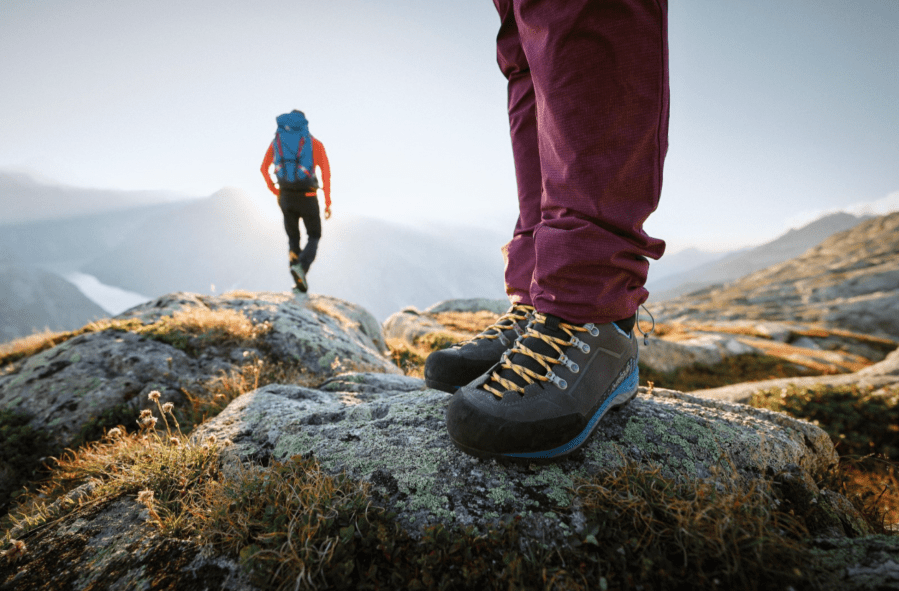
Features to look for in mountaineering boots
Fit
Winter boots are quite stiff and fit is important. Try them on with an experienced boot fitter to hand. Lots of heel lift is bad, but toes need wiggle room. Tight boots can cause frostbite, but you don’t want your foot sliding forward when kicking steps.
Last
The “last” is a mould around which a boot is constructed. Lasts vary in shape and volume- as do human feet- and different brands use different shapes. Look out for variation in the size and shape of toe box and heel cup as well as overall width.
Uppers
Modern winter boots are often a composite mix of leather and synthetic materials, with trade-off between weight, warmth and durability.
Rand
A rubber rand covers the point where the uppers meet the sole, which adds durability. This is important for protecting the boot when kicking in to hard snow and scrambling on rock.
Lacing
Look out for locking cleats, and free running cleats that allow one section to be cinched in tight, and another to be slackened off. Typically, a looser fit is more comfortable on the approach, but once crampons are on everything needs to be snug.
Waterproof Membrane
A waterproof membrane is vital, to keep the feet dry and prevent frostbite. Gore-Tex is the most frequently used, in the form of sock-like insert. The Scarpa boot in the women’s test uses a membrane that is laminated directly to the uppers.
Weight
Boots designed for winter mountaineering tend to be heavier than their summer counterparts, (typically 2kg a pair), but increasingly, lightweight models are available. Bear in mind that there may be a compromise in warmth or durability to keep the weight low.
Stiffness
Winter mountaineering boots are stiff to make it easier to fit crampons, and to improve the efficiency of kicking in to compact and refrozen snow.
Edges
The sole has a tread that is designed to shed snow, and the edges of the sole are neat and defined, useful for slicing the foot into snow to kick out footsteps.
Crampon Compatibility
B1 Boots are the most flexible of winter specific boots and compatible with C1 crampons only – that have a basket at the front and back. It is possible to attach crampons to flexible footwear, but the more flexible the boot, the greater the likelihood of crampons becoming detached on steep ground. C1 crampons are fine for most UK hillwalking.
B2 Boots are compatible with C2 crampons (with a basket at the front, and a heel clip lever at the back). C2 crampons are well suited to both challenging winter mountain walking and ‘graded’ ground which involves a level of technicality (e.g. many popular scrambles in winter conditions). They are less fiddly to put on and have more spikes than C1, but require quite a stiff boot, with a ledge at the back for the lever to rest on. B2 boots can be worn with C1 or C2 crampons, but not C3 crampons.
B3 boots do not flex, have ledges at toe and heel, and are compatible with C3 crampons. These rigid, aggressive crampons are designed for winter / ice climbing and technical mountaineering and as such are overkill for hillwalking.

